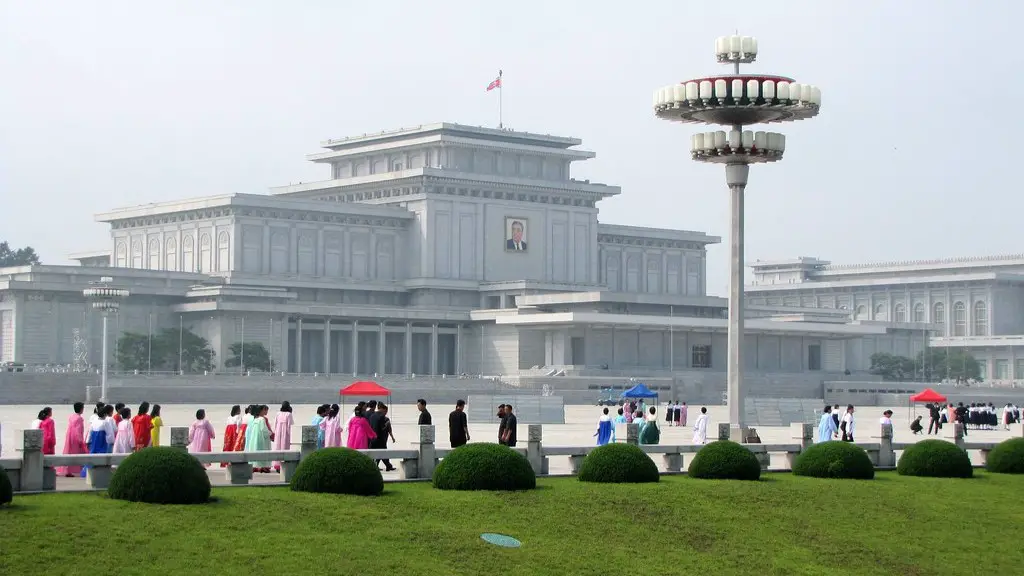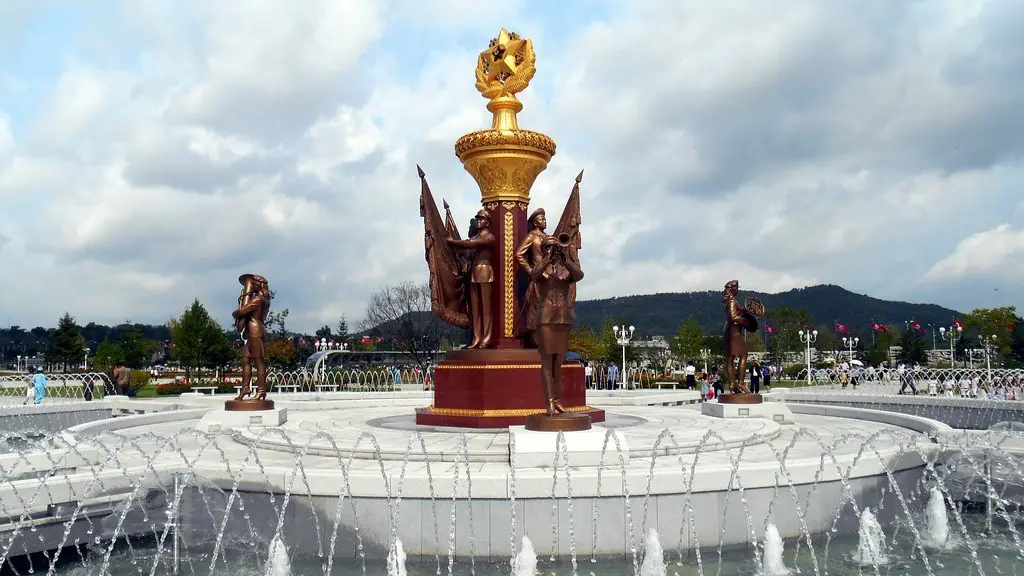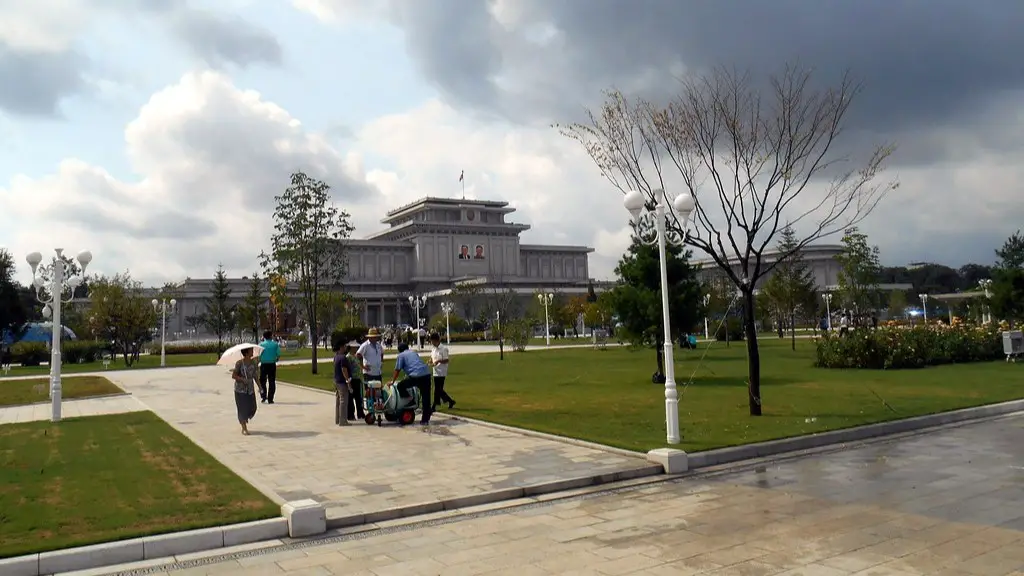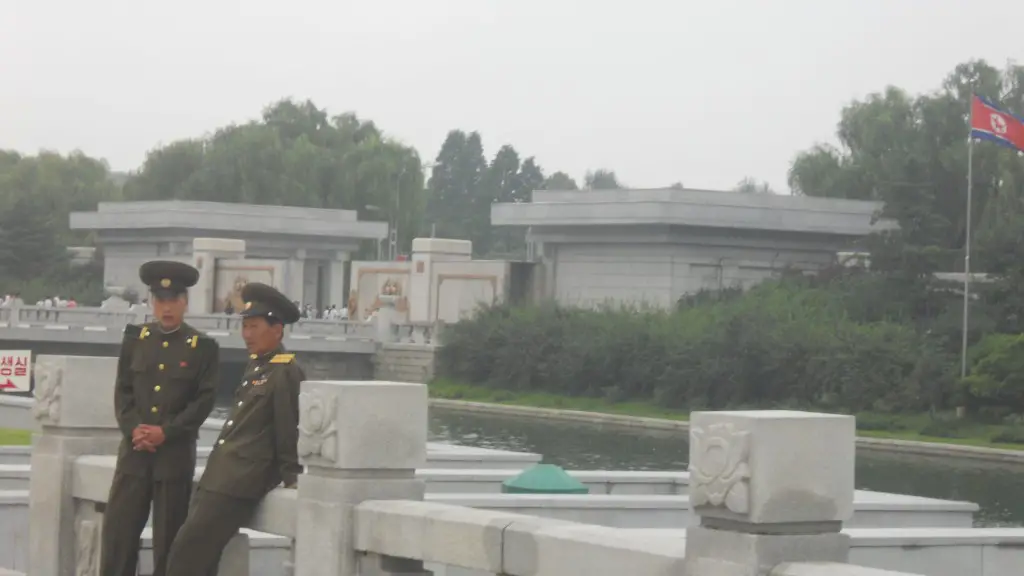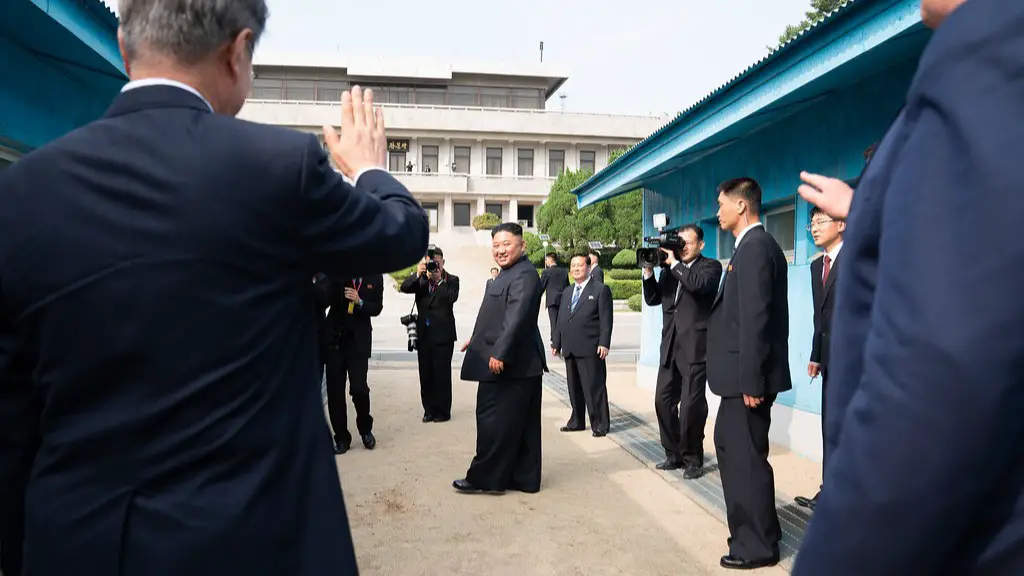Military Might
The militaristic capabilities of South Korea could be an issue to consider in the event of a hypothetical invasion. South Korea has an active-duty military of well-over 600,000 personnel, making it one of the largest forces in the region. It has been recently estimated by the Pentagon that their forces outnumber the North Korean military by a ratio of 4:1 in terms of active-duty personnel. South Korea also boasts a relatively advanced arsenal, featuring top-of-the-range aircraft, armoured vehicles, submarines and other weapons. According the International Institute for Strategic Studies, the South Korean military has an annual budget of approximately $43 billion in comparison to the North’s estimated $5 billion.
It is also noteworthy that the South Korean Army has had much more experience of battle than its North Korean counterparts in the post-WWII era, having fought alongside United Nations forces in the Korean War. In fact, this war has entered South Korean public consciousness so poignantly that the South Korean government has built a memorial called the War Memorial to honour those who lost their lives fighting in the war. In contrast, North Korean forces have not had any recent major combat operations that would give them the tactical experience or combat confidence which could be valuable assets in a conflict.
Economic Impact
In the event of a war, the economic toll on both nations would be immeasurable. Although figures are hard to come by, due to the secretive nature of the North Korean economy, it has been estimated that in 2017, the value of North Korean industrial output was somewhere in the region of $12 billion dollars. As compared to South Korea’s industrial production of $1.3 trillions, it is clear that the North Korean economy would take a major hit in the event of a hostile situation.
South Korea’s economy, while having much more to lose, would certainly not escape unscathed. With both nations possessing a vast arsenal of weapons, the potential for major cities such as Seoul, Busan and Pyongyang falling victim to indiscriminate shelling would not be out of the question, leading to significant economic disruption. Not only would this result in thousands of cubic meters of debris to clear up and billions of dollars of property damages to repair, businesses would suffer immensely as a result of the seismic fallout.
Political Implications
It is also important to consider the political ramifications that a large military presence in North Korea would have on the region, and indeed the world. Should South Korea succeed in removing the North Korean state, the country would likely be subject to both direct and indirect control by the South, as all of the North’s political institutions and core infrastructure would all but be eliminated. The North would become absorbed into a unified Korea, albeit with a heavily southern flavour.
The repercussions of such an event would also be felt internationally. South Korea is an important ally of several Western nations, particularly the United States and Japan, who have both promised to defend the country should it be attacked by the North. In the event of the latter’s defeat, it is reasonable to assume that these allies would be more likely to provide military and financial aid. This is no small issue, with the US boasting a robust military of its own and Japan having a substantially prosperous economy, sharing these resources with a unified Korea would have no small impact on the global balance of power.
Domestic Reaction
As one may expect, the Korean public would be divided when it came to the potential of a unified Korea. On one hand, the news of the unification of the two Koreas would be welcomed in South Korea with open arms and celebration. For many in the South, such an event would represent centuries of inter-Korean conflict, violence and suffering under the rule of a tyrannical North Korean regime finally coming to an end. However, while the South would celebrate such an event, there is a small chance that the North Korean population may not respond in the same manner.
It is understandable that many North Korean citizens may feel underwhelmed, at least initially, by the news of unification. South Koreans are well-known for their loyalty towards their state and the influx of Northerners may create a sense of uneasiness and discontent amongst the public.
The South Korean Government must consider how it manages the integration of both economies into a unified Korea. It is paramount that the government remains open and considerate in its dealings with the North Koreans and invests time into creating fair economic and social policies to ensure the successful integration of both communities for a better future for both nations.
Impact On International Relations
It is highly unlikely that such an event would go unnoticed by the international community. In fact, the implications of a unified Korea would drastically affect the security dynamics of East central Asia. One of China’s main ally’s, the North Korean state, would disappear, leaving Chinese rulers in an awkward diplomatic position. Additionally, a unified Korea would no longer need assistance from the United Nations Command, meaning that the US would lose a substantial amount of strategic influence in the region.
The global community would also need to consider how best to approach this new power. To maintain peace and stability in the region, it may be prudent for the US and China to increase cooperation to ensure that South Korea does not overextend its influence.
The possibility of economic and diplomatic sanctions could also not be ruled out as a means of avoiding tensions in the once warring states. This could be applied, for instance, towards Russian companies or individuals found to be trading with North Korea in violation of United Nations resolutions.
International Aid
Should the reunification take place, the role of international aid organizations in the integration of the two states would prove to be invaluable. Aid could take several forms, from basic food aid which would be necessary to ensure stability and prevent mass starvation and food insecurity, to specialist aid missions that could help to ensure the smooth running of a unified nation.
Infrastructure would also prove to be a major challenge, especially in North Korea. Few roads, bridges and railroads exist in the nation and providing them could prove to be an immense task. The provision of clean drinking water would also be a must, whilst schools and health institutions would need to be built. Donor countries would be expected to provide much of the necessary funding for such projects, though it is possible that a unified Korea would also try to fund some of the modernization themselves through international loans.
International Condemnation
The United Nations has been highly critical of the human rights record of the North Korean government and any reunification would likely be seen with derision by numerous international organisations, especially the UN. It is unlikely that the international body would approve of a unilateral action and could very well punish the South for their actions through diplomatic sanctions or military intervention.
Furthermore, an invasion would also spur other nations in the region to potentially intervene in the conflict. Japan, for example, has pledged to defend South Korea if it were ever attacked. This could open the potential for a proxy war between the two countries, should the conflict escalate. The chances of this may perhaps be lessened by US diplomatic engagement, though it would remain a distinct possibility.
Potential Post War Issues
In the aftermath of any armed conflict between the two countries, numerous political, economic, and social issues would need to be solved. Major questions will be raised: Who will be responsible for providing aid to the North? Who will be in charge of drawing up the new legal system? Who will participate in the writing of a new constitution? How will refugees be accommodated? These are just some of the questions that would need to be answered.
Additionally, South Korea would also need to consider how best to manage relations between themselves and the North. Would they continue a heavy military presence in the former North, or would they invest in non-military alternatives such as economic development projects and diplomatic engagement? This is yet another matter which must be considered, for the successful integration of the two nations could depend on it.
Cultural Impact
Reunification between the two Koreas would also have a major cultural impact. While South Koreans are obsessed with all things technological, North Koreans lack access to the same luxuries which enjoy most South Koreans. This would mean that many North Koreans could very well find themselves feeling overwhelmed by the vast amount of technological advancement and development, especially in big cities like Seoul.
On the other hand, South Koreans could also find themselves feeling immensely proud of their country and the resulting reunification, feeling that they have truly achieved something remarkable in effecting a major political and cultural milestone in East Central Asian history.
Time Frame
Time would also be a major factor to consider in the event of a unification. The process of reuniting the two Koreas would most likely be far more complicated than simply unifying two countries in the same culture and language. Both political and social issues would need to be addressed and resolved before any progress could be made. This could take anything from a few years to decades, as there is simply no way of accurately predicting the time frame involved in such a complex and delicate operation.
It is also important to note that many of the issues discussed in this article are strictly hypothetical. While it is important to consider all potential outcomes, it is also essential to remember that these events are largely speculative and may not be applicable to all hypothetical scenarios.
